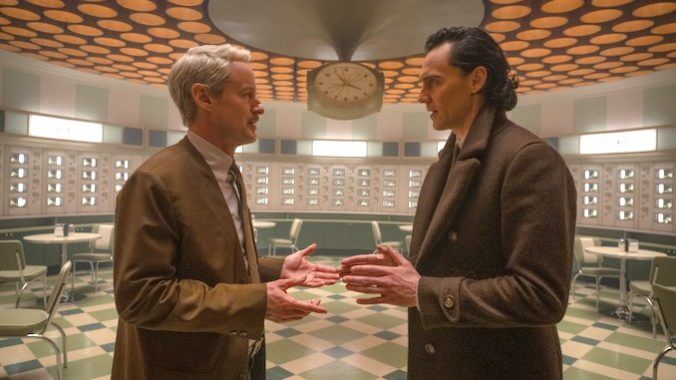Disney+’s Loki Continues to be Convoluted Yet Compelling in Season 2
Photo Courtesy of Disney+
The first season of Marvel Studios’ Loki was a breath of timey-wimey fresh air, following up on the genre-busting attitude of WandaVision to show the ambitious potential of what Marvel Studios could do with big screen budgets and the freedom of streaming on Disney+.
But that was 2021. The MCU has changed a lot since then, and a few recent releases (looking at you, Ant-Man and the Wasp: Quantumania and Secret Invasion) have failed to really blow critics away in the same way the generally-bulletproof MCU has done for the past decade or so consistently.
Just for those keeping count: since the first season of Loki introduced new big bad Jonathan Majors as He Who Remains (aka Kang the Conqueror), we have seen Hawkeye, Moon Knight, Ms. Marvel, She-Hulk, Werewolf by Night, and Secret Invasion all come and go—not to mention big screen entries like Doctor Strange in the Multiverse of Madness, Thor: Love and Thunder, Black Panther: Wakanda Forever, Ant-Man and the Wasp: Quantumania, and Guardians of the Galaxy Vol. 3.
That’s… a lot.
So with Loki finally back for its eagerly-awaited second season, we find Loki (Tom Hiddleston) and his partner in time-saving shenanigans Mobius (Owen Wilson) trying to piece together the fallout of Season 1 and what it means for the TVA, themselves, and the multiverse at large. Fittingly, the new season picks up right where Season 1 left off, with Loki trying to figure out what in the multiverse is going on after Sylvie (Sophia Di Martino) killed He Who Remains and ushered in a new era of branching timeline chaos.
Loki has remained near the top of the list as one of Marvel’s best shows, and thankfully that doesn’t change in Season 2 (at least during the first four episodes screened for critics). This show is still whip smart, fun, funny, ambitious, geeky, and compelling as hell. Hiddleston could be reading a phone book and make it look good, while the supporting cast of Wilson, Majors (still in a significant role despite his current legal troubles), Di Martino, Gugu Mbatha-Raw, and Wunmi Mosaku continue to make this weird world feel real. The addition of genre fan favorite Ke Huy Quan (Indiana Jones and the Temple of Doom, The Goonies, Everything Everywhere All at Once) as a new character is a great move to add some fresh blood to Season 2.
The chemistry between Hiddleston and Wilson continues to be one of the best elements of this series, and that buddy-cop vibe remains alive and well. The same goes for Hiddleston and Di Martino’s crackling, weird romantic energy, and yeah, they know what works and continue to lean into it. The supporting players also get more to do, as we get to see some creative combinations of the cast in new and different ways, creating new situations for actors to play off one another in ways we didn’t see in Season 1. Plus, Majors’ return comes with a fascinating and unexpected approach we won’t spoil here.
-

-

-

-

-

-

-

-

-

-

-

-

-

-

-

-

-

-

-

-

-

-

-

-

-

-

-

-

-

-

-

-

-

-

-

-

-

-

-

-








































